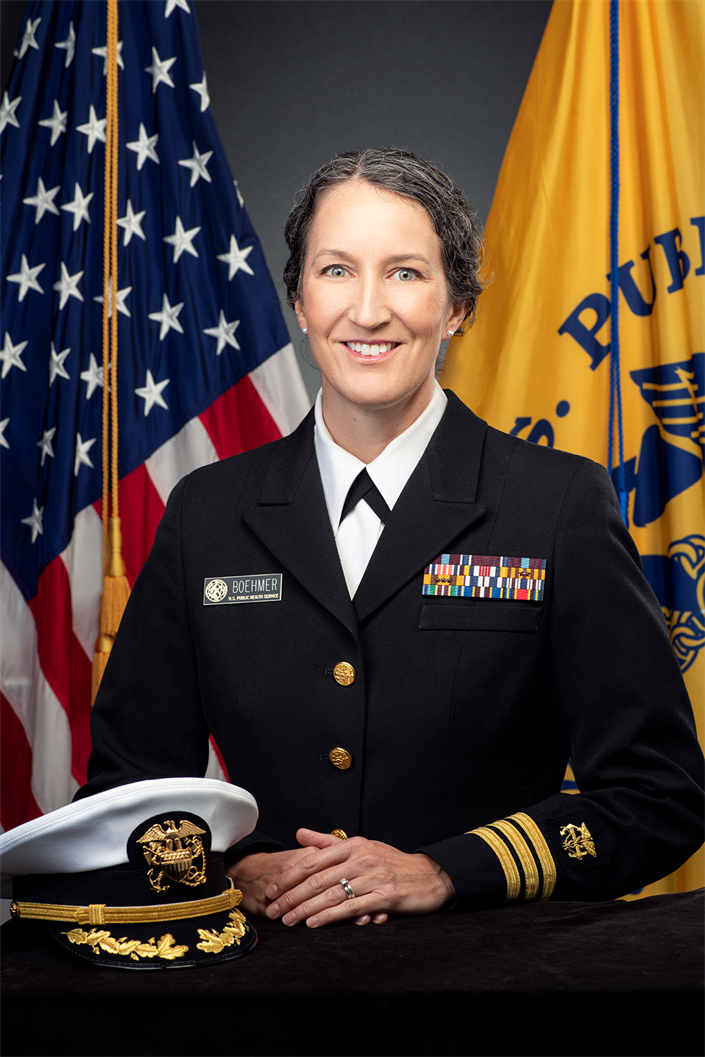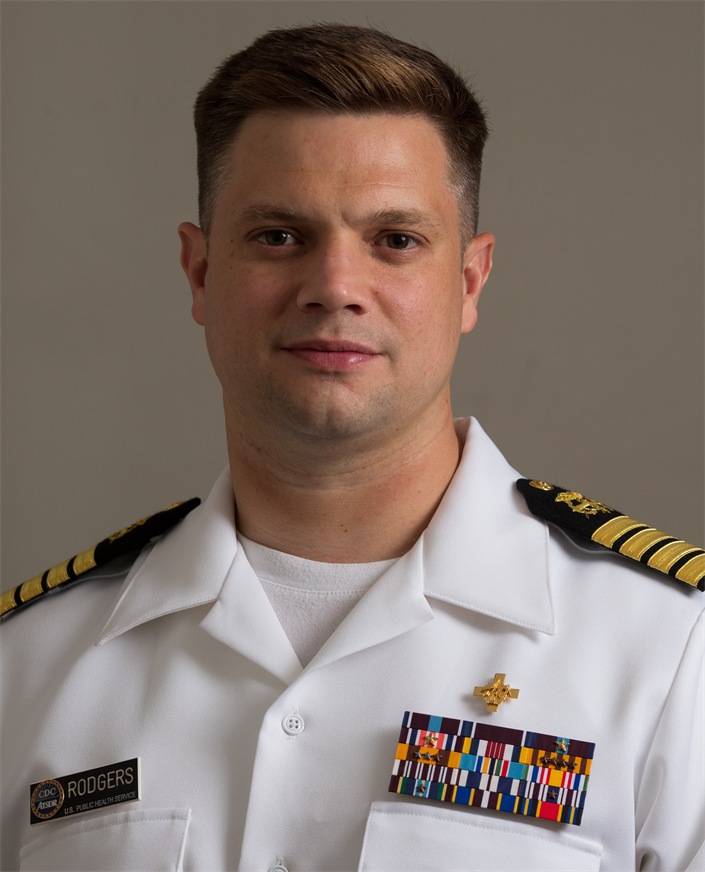2022 SHALON m. iRVING mEMORIAL JUNIOR SCIENTIST OFFICER OF THE YEAR AWARD WINNER
LCDR Xinzhi Zhang
 LCDR Xinzhi Zhang, MD, PhD, FACE, is the Chief of Health Inequities and Global Health Branch at the Center for Translation Research and Implementation Science at the National Heart, Lung, and Blood Institute (NHLBI), part of the National Institutes of Health (NIH). He has broad research interests that include clinical epidemiology, health services research, data science, health informatics, and their applications to promote health equity nationally and globally.
LCDR Xinzhi Zhang, MD, PhD, FACE, is the Chief of Health Inequities and Global Health Branch at the Center for Translation Research and Implementation Science at the National Heart, Lung, and Blood Institute (NHLBI), part of the National Institutes of Health (NIH). He has broad research interests that include clinical epidemiology, health services research, data science, health informatics, and their applications to promote health equity nationally and globally.
Before joining NHLBI, LCDR Zhang was a program director in the National Center for Advancing Translational Sciences (NCATS) Division of Clinical Innovation, where he managed a portfolio of Clinical and Translational Science Awards (CTSA), including overseeing the CTSA National Center for Data to Health (CD2H). During the COVID-19 pandemic, CD2H initiated National COVID Cohort Collaborative (N3C), the first-ever nationally centralized electronic medical record data openly accessible for the clinical and research community to use for studying COVID-19 and for identifying potential treatments. LCDR Zhang was the NCATS lead on rural health and health equity and Co-Chaired the NIH Rural Health Interest Group. He was also the lead for the diversity and re-entry research supplements program.
LCDR Zhang joined NIH in 2012 as a program director in the National Institute on Minority Health and Health Disparities’ Division of Extramural Scientific Programs where he provided leadership for scientific program development and project management on minority health and health disparities research. He spearheaded the development of research initiatives including Multilevel Chronic Disease Prevention, Simulation Modeling and System Science, Enhancing Diversity in Biomedical Data Science, and Social Determinants of Health Collection using the PhenX Toolkit.
Prior to that, LCDR Zhang had joined the National Center for Infectious Diseases’ Office of Surveillance at the Centers for Disease Control and Prevention (CDC) in 2003 as a Steven M. Teutsch Prevention Effectiveness Fellow. His pandemic preparedness tool, FluSurge, is widely recommended (e.g. by WHO/PAHO, Johns Hopkins University) and used (e.g., by STAT, countries like Spain) to estimate surges in demand for hospital-based services during the COVID-19 pandemic. From 2005 to 2012, he was an epidemiologist in CDC’s National Center for Chronic Disease Prevention and Health Promotion’s Division of Diabetes Translation and was instrumental in establishing the vision and eye health program at CDC.
LCDR Zhang has authored 4 papers for inclusion in CDC’s Morbidity and Mortality Weekly Report, 3 book chapters, and 70 articles published in peer-reviewed journals, including the Journal of the American Medical Association, the American Journal of Public Health, and the American Journal of Preventive Medicine. He is one of the editors of the 2021 textbook on The Science of Health Disparities Research. He also served as the interim Editor-in-Chief of journal Health Equity.
Throughout his career, LCDR Zhang has received many honors and awards from NIH, CDC, AHRQ, American Public Health Association, and Commissioned Corps of the U.S. Public Health Service, including 2 Presidential Unit Citations and 2 Outstanding Service Medals. LCDR Zhang received his M.D. from Peking Union Medical College in 1998 and his Ph.D. in health services administration from the University of Alabama at Birmingham in 2003.
2022 DEREK DUNN MEMORIAL SENIOR SCIENTIST OFFICER OF THE YEAR AWARD WINNER
CDR Tegan Boehmer
 CDR Tegan Boehmer, PhD, MPH, is a senior health scientist at the U.S. Centers for Disease Control and Prevention. She earned a Ph.D. in Public Health Studies and M.P.H. in Epidemiology from Saint Louis University School of Public Health. CDR Boehmer began her career at CDC in 2006 with the Epidemic Intelligence Service (EIS) program investigating infectious and occupational disease outbreaks at the Tri-County Health Department in Colorado. After completing EIS, she held various scientific, response, and leadership positions within CDC’s National Center for Environmental Health (NCEH) from 2008 to 2020. She advised the World Health Organization, Health Canada, and U.S. Environmental Protection Agency on the state of the science and guidelines for protecting people from harmful effects of air pollution and advanced federal partnerships with U.S. Department of Transportation and the National Park Service that resulted in resources to guide evidence-based decision making around transportation and trails and green space. As Chief of the Health Studies Branch, NCEH, she oversaw groundbreaking work to minimize the impact of environmental health disasters and emerging hazards. Notably, she secured $10M in 2017 hurricane recovery funding that resulted in several innovative programs to enhance disaster epidemiology and preparedness in affected jurisdictions. In 2020, CDR Boehmer transitioned to CDC’s Center for Surveillance, Epidemiology, and Laboratory Services where she serves as a Senior Health Scientist in the Public Health Informatics Office.
CDR Tegan Boehmer, PhD, MPH, is a senior health scientist at the U.S. Centers for Disease Control and Prevention. She earned a Ph.D. in Public Health Studies and M.P.H. in Epidemiology from Saint Louis University School of Public Health. CDR Boehmer began her career at CDC in 2006 with the Epidemic Intelligence Service (EIS) program investigating infectious and occupational disease outbreaks at the Tri-County Health Department in Colorado. After completing EIS, she held various scientific, response, and leadership positions within CDC’s National Center for Environmental Health (NCEH) from 2008 to 2020. She advised the World Health Organization, Health Canada, and U.S. Environmental Protection Agency on the state of the science and guidelines for protecting people from harmful effects of air pollution and advanced federal partnerships with U.S. Department of Transportation and the National Park Service that resulted in resources to guide evidence-based decision making around transportation and trails and green space. As Chief of the Health Studies Branch, NCEH, she oversaw groundbreaking work to minimize the impact of environmental health disasters and emerging hazards. Notably, she secured $10M in 2017 hurricane recovery funding that resulted in several innovative programs to enhance disaster epidemiology and preparedness in affected jurisdictions. In 2020, CDR Boehmer transitioned to CDC’s Center for Surveillance, Epidemiology, and Laboratory Services where she serves as a Senior Health Scientist in the Public Health Informatics Office.
CDR Boehmer is a graduate of CDC’s Incident Manager Training and Development Program. She has held high-level leadership roles in CDC emergency responses for hurricanes (2017, 2018), lung injury associated with vaping (2019), and COVID-19 pandemic (2020–2022) and deployed with USPHS to support the Unaccompanied Children Mission (2021). CDR Boehmer has been on a near-continual deployment to CDC’S COVID-19 Response since March 2020 during which time she oversaw national laboratory and emergency department surveillance; development of CDC’s “big data” computing infrastructure; and evaluation, procurement, and analysis of novel healthcare data sources. In two years, CDR Boehmer co-authored 23 high-impact scientific publications (11 as a lead or senior author) that advanced COVID-19 epidemiology and informed U.S. and international guidelines for vaccine prioritization and national policy decisions related to vaccine adverse events.
CDR Boehmer has contributed substantially to SciPAC and Atlanta COA. During two terms as a SciPAC voting member, CDR Boehmer served as COF Liaison, Secretary, Website Subcommittee Chair, and Category Day Subcommittee Chair. After her second term ended in 2015, she continued to serve the USPHS and Scientist category by reviewing officer CVs and recruitment applications, serving on the SciPAC Rules and Membership Subcommittee, mentoring junior officers, and recruiting, supervising, and mentoring USPHS officers in the EIS program. CDR Boehmer currently serves on the Atlanta COA Executive Committee as the Events Planning Co-chair and previously coordinated multiple community service events. In addition to numerous USPHS awards, she has been honored with multiple agency awards including a 2021 individual honor award for Excellence in Surveillance and Health Monitoring for her exemplary leadership and scientific impact during the COVID-19 pandemic.
2022 SCIENTIST RESPONDER OF THE YEAR AWARD WINNER
CAPT Loren Rogers
 CAPT Loren Rodgers is currently CDC’s Data Modernization Coordinator in the Office of the Chief Information Officer. He holds a Ph.D. in Biology from the University of California, San Diego, and he began is HHS career with the Food and Drug Administraiton as a Vaccine Reviewer. His CDC roles include directing two of CDC’s major IT platforms: Tiberius and the National Syndromic Surveillance System. These systems provide local, state, and federal partners with real-time situational awareness of emerging health threats and supply chain intelligence for managing medical countermeasures. He has overseen teams in two CDC Centers, leading initiatives to improve the national health information infrastructure. He has led dozens of outbreak investigations, and was an Epidemic Intelligence Service Officer assigned to the Ohio Department of Health.
CAPT Loren Rodgers is currently CDC’s Data Modernization Coordinator in the Office of the Chief Information Officer. He holds a Ph.D. in Biology from the University of California, San Diego, and he began is HHS career with the Food and Drug Administraiton as a Vaccine Reviewer. His CDC roles include directing two of CDC’s major IT platforms: Tiberius and the National Syndromic Surveillance System. These systems provide local, state, and federal partners with real-time situational awareness of emerging health threats and supply chain intelligence for managing medical countermeasures. He has overseen teams in two CDC Centers, leading initiatives to improve the national health information infrastructure. He has led dozens of outbreak investigations, and was an Epidemic Intelligence Service Officer assigned to the Ohio Department of Health.
CAPT Rodgers has served as a subject matter expert or leader in >15 agency or PHS deployments, including leading teams of contact tracers in Guinea, conducting post-earthquake logistics in Haiti, and serving as an epidemiology advisor in the White House. He is committed to supporting he careers of fellow officers, and has served as a prior Chair of SciPAC.
2022 SCIENTIST MENTOR OF THE YEAR AWARD WINNER
CDR Kamil Barbour
 CDR Barbour is a Supervisory Epidemiologist/Team Lead with over 11-years of experience at the CDC and in the USPHS. He completed his PhD in Epidemiology with a focus on musculoskeletal disorders from the University of Pittsburgh in 2010 and immediately after commissioned into the USPHS via the CDC’s Epidemic Intelligence Service (EIS) program. As Team Lead of the State Chronic Disease Epidemiology Assignee program, he supervises Corps officers and manages a prolific applied epidemiologic research program aimed at reducing risk for a range of chronic conditions. In this role, he applies his expertise to facilitate the growth of his supervisees, both as applied epidemiologists and Corps officers. Additionally, CDR Barbour directs and manages an $11M public health research portfolio for lupus and interstitial cystitis epidemiology, establishing six novel disease registries at major academic institutions and publishing cutting-edge research. He also oversees efforts by two national rheumatology organizations to implement the dissemination of lupus public health interventions.
CDR Barbour is a Supervisory Epidemiologist/Team Lead with over 11-years of experience at the CDC and in the USPHS. He completed his PhD in Epidemiology with a focus on musculoskeletal disorders from the University of Pittsburgh in 2010 and immediately after commissioned into the USPHS via the CDC’s Epidemic Intelligence Service (EIS) program. As Team Lead of the State Chronic Disease Epidemiology Assignee program, he supervises Corps officers and manages a prolific applied epidemiologic research program aimed at reducing risk for a range of chronic conditions. In this role, he applies his expertise to facilitate the growth of his supervisees, both as applied epidemiologists and Corps officers. Additionally, CDR Barbour directs and manages an $11M public health research portfolio for lupus and interstitial cystitis epidemiology, establishing six novel disease registries at major academic institutions and publishing cutting-edge research. He also oversees efforts by two national rheumatology organizations to implement the dissemination of lupus public health interventions.
CDR Barbour has been particularly active on the SciPAC, where he has served as a Voting Member since 2016 and led as an Executive Board member and Subcommittee Chair for over 7 years. CDR Barbour has deployed 6-times for COVID-19 including 1) as Section Lead of the Vaccine Data Section in the Data Analytics and Visualization Taskforce, 2) with PHS to the JFK Quarantine Station in NYC, 3) as Epi and Analysis Team Lead in the Vaccine Taskforce, 4) as Associate Director of Science for the CDC’s Community Interventions and Critical Populations Taskforce, 5) as Deputy Team Lead for the High-Risk Populations Team, and 6) and as a Senior Scientist working on efforts to mitigate cruise ship outbreaks.
CDR Barbour deeply values mentorship, considers it a major part of his job duties, and takes great pride in being a mentor to Scientist Officers. He serves as an official mentor to 5 junior Scientist Officers and an unofficial mentor to numerous other Officers. CDR Barbour works closely with his mentees to set goals to foster growth and leadership skills—and always checks in to track progress on benchmarks. Many of his mentees have been working closely with him for over 5 years. CDR Barbour’s mentees are heavily involved in SciPAC with 4 in leadership positions as SciPAC SC Chairs/Co-Chairs and 2 selected as Voting Members. Under CDC Barbour’s guidance his mentees have achieved an excellent level of promotion success and are now successfully mentoring junior officers.